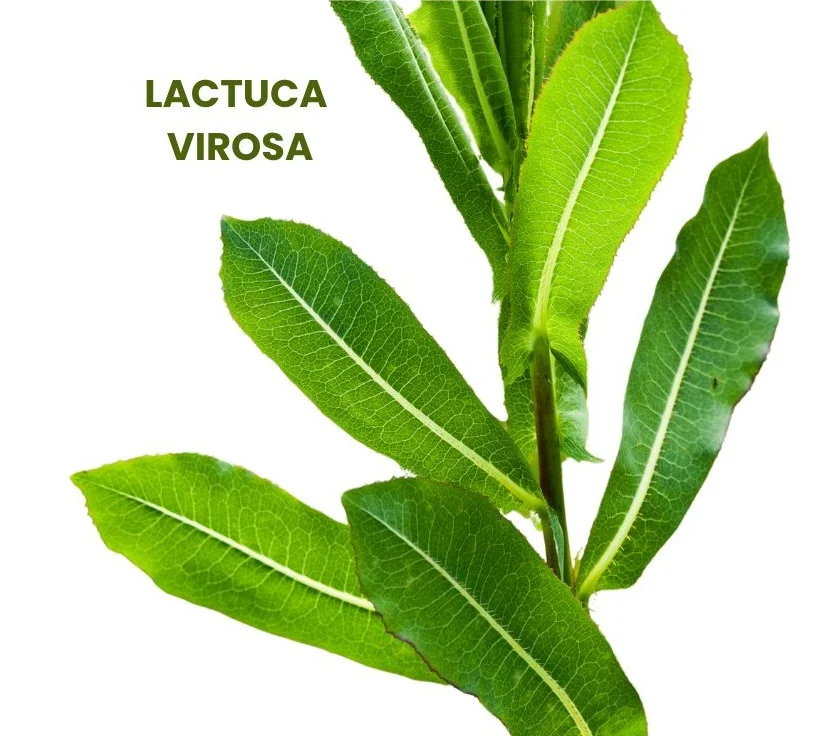Lactuca virosa, commonly known as Acrid Lettuce, is a plant-based remedy that acts primarily on the brain and circulatory system.
It is often used to treat conditions such as delirium tremens, hydrothorax, ascites, and impotence.
Additionally, it has notable effects on the respiratory system and extremities.
This remedy is also known to be a true galactagogue, promoting milk production.

SOURCE INFORMATION
- Common Name: Acrid Lettuce
- Scientific Name: Lactuca virosa
Scientific Classification
- Kingdom: Plantae
- Clade: Angiosperms
- Order: Asterales
- Family: Asteraceae
- Genus: Lactuca
- Species: L. virosa
Origin
- Lactuca virosa is native to Europe, North Africa, and Asia.
- It has been used in traditional medicine for centuries, primarily for its sedative and analgesic properties.
- The plant is similar in appearance to the common lettuce but contains much stronger active compounds.
Historical Facts
- Historically, Lactuca virosa was used as a sedative and pain reliever.
- It was also employed to treat coughs, asthma, and menstrual problems.
- The ancient Egyptians used Lactuca virosa to promote milk production in nursing mothers.
DRUG PATHOGENESIS
- Lactuca virosa acts on the central nervous system, inducing sedation and pain relief.
- It also influences the respiratory and circulatory systems, making it effective for various chest and abdominal complaints.
- The plant’s active compounds, lactucopicrin, and lactucin, contribute to its medicinal properties.
KEY CHARACTERISTICS
- Sedative and Pain Reliever: Helps in calming the mind and alleviating pain.
- Galactagogue: Promotes milk production in nursing mothers.
- Respiratory Support: Aids in relieving cough and breathing difficulties.
- Circulatory System: Acts on the circulatory system to address conditions like hydrothorax and ascites.
DETAILED ORGAN SYMPTOMS
MIND
- Stupefaction of Senses: Patients may feel mentally dull and unresponsive.
- Great Restlessness: A significant sense of unease and inability to stay still.
HEAD
- Dull, Heavy, Confused, Dizzy: The head feels unclear and heavy, often with dizziness.
- Heat of Face and Headache: Accompanied by general coldness in the rest of the body.
- Headache with Respiratory Issues: Headache linked to respiratory conditions.
ABDOMEN
- Weight and Fullness Sensation: The abdomen feels heavy and full.
- Borborygmi: Rumbling noises in the intestines.
- Abundant Emission of Wind: Frequent passing of gas.
- Early Morning Colic: Abdominal pain that is somewhat relieved by evacuation and passing gas.
CHEST
- Difficult Breathing: Trouble breathing, often due to chest congestion or fluid.
- Suffocative Breathing from Dropsy: Severe breathing difficulty due to fluid in the chest.
- Constant Tickling Cough: Persistent cough that feels like the chest will burst.
- Squeezing Sensation in Lower Chest: Tightness and pressure in the lower chest.
FEMALE
- Promotes Catamenia: Stimulates menstrual flow.
- Increases Milk Production: Enhances milk production in nursing mothers (similar to Asafoetida).
SLEEP
- Restless: Difficulty in falling asleep due to restlessness.
- Deep, Comatose Sleep: Profound and heavy sleep, often difficult to wake from.
EXTREMITIES
- Lame Hip Down Left Side: Pain and weakness in the hip extending down the left side, worse with walking.
- Coldness and Numbness: Feet and legs feel cold and numb.
- Tremor of Hands and Arms: Shaking and trembling of the hands and arms.
- Cramps in Shin Bones: Painful cramps extending to toes and sides of legs, involving the calves.
MODALITIES
- Worse: Walking and moving.
RELATIONSHIP WITH OTHER DRUGS
Antidotes
- Acetum Acidum (Acet ac): Vinegar or acetic acid can counteract the effects.
- Coffea (Coff): Coffee, due to its stimulant properties, can mitigate the sedative effects of Lactuca virosa.
Comparative Remedies
- Nabalus (Prenanthes Serpentaria or Rattlesnake Root, White Lettuce): Similar to Lactuca virosa, this remedy is used for chronic diarrhea, particularly when symptoms worsen after eating, at night, or towards the morning.
- It is also used for abdominal and rectal pain, emaciation, constipation, and somnolence. Individuals may be susceptible to the aura of others.
- It treats dyspepsia with acid burning eructation and a craving for acidic food.
- Additionally, it is useful for leucorrhea with throbbing sensations in the uterus.
- Lachesis (Lach): A remedy that shares several overlapping symptoms and uses with Lactuca virosa.
- Kali Carbonicum (Kali carb): Often compared due to its similar effects, particularly on the respiratory system and general body pains.
- Spiranthes: Known for its galactagogue properties, making it useful in promoting milk production like Lactuca virosa.
DOSE
- Form: Tincture.
- Dosage: Lower triturations are generally used.
Frequently Asked Questions
What is Lactuca virosa used for?
- It is primarily used for its sedative, pain-relieving, and galactagogue properties.
- It also addresses respiratory and circulatory issues.
How is Lactuca virosa administered?
- It is typically taken as a tincture, with the dosage depending on the condition being treated.
What are the side effects of Lactuca virosa?
- Possible side effects include dizziness, confusion, and severe restlessness.
Can Lactuca virosa be used for sleep problems?
- Yes, it has sedative properties that can help with insomnia and restlessness.
Is Lactuca virosa safe for everyone?
- It should be used with caution and under medical supervision, especially in individuals with pre-existing conditions or those taking other medications.
Glossary of Difficult Words
- Galactagogue: A substance that promotes milk production in nursing mothers.
- Hydrothorax: Fluid accumulation in the chest cavity.
- Ascites: Fluid accumulation in the abdominal cavity.
- Borborygmi: Rumbling or gurgling noises in the intestines.
- Suffocative: Causing difficulty in breathing.
- Catamenia: Menstrual flow.
This detailed drug picture of Lactuca virosa (Acrid Lettuce) provides comprehensive information on its sources, uses, symptoms it can treat, and other relevant details, making it a valuable remedy in traditional and homeopathic medicine for various conditions.
